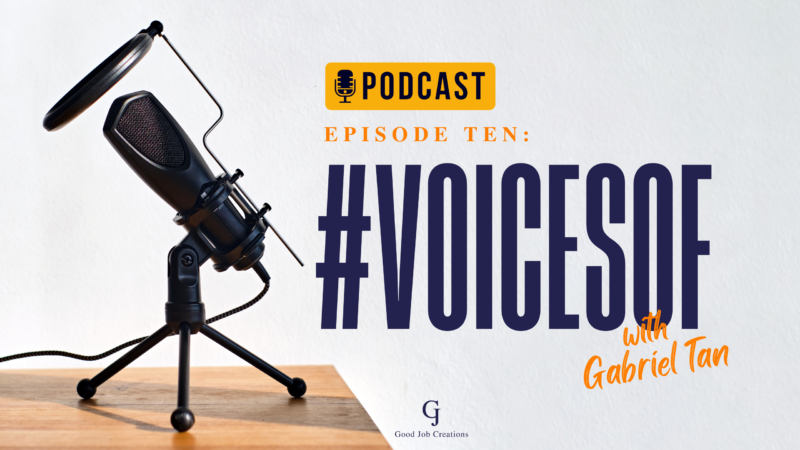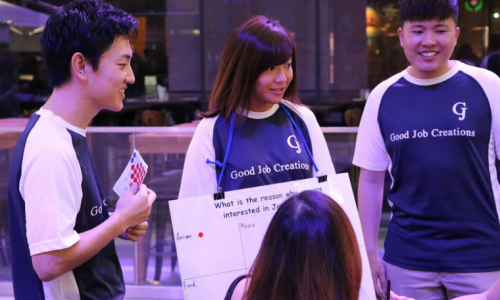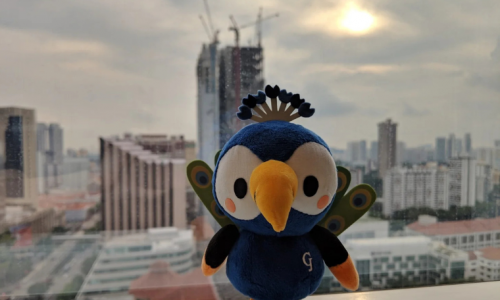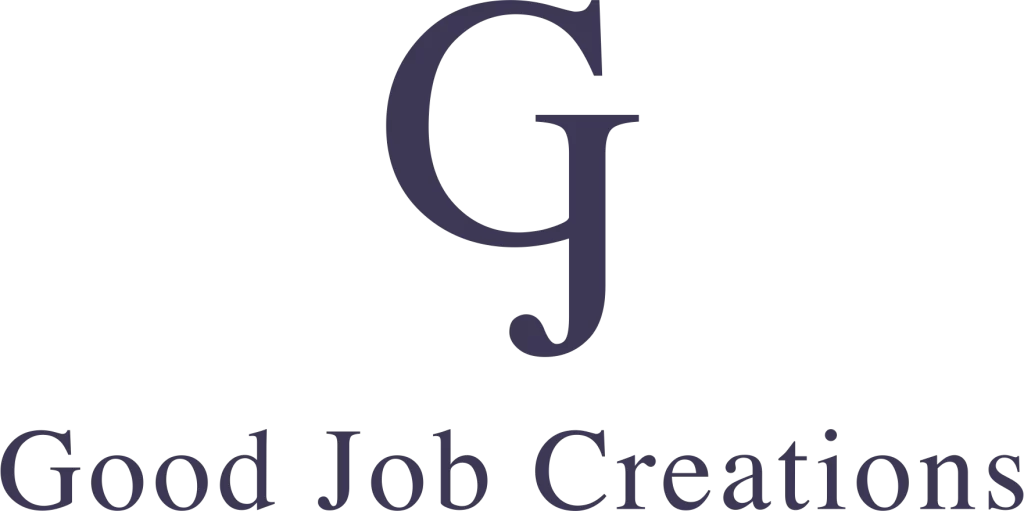Catch a sneak peek here:
or stream the full episode on:
An ex-banker turn Consultant, Tan Gabriel, shares the importance of Emotional Intelligence (EI) and why it matters in a people-first industry.
Destiny Goh: Welcome back to episode six of #VoicesOf. My name is Destiny, and joining me today is consultant Gabriel Tan, whose portfolio is in banking and finance. Hi Gabriel, please tell us about yourself and what it’s like being in a recruitment industry today.
Gabriel Tan: Hi Destiny. For me, I used to work in a bank, and of course, with being in the bank, I get to communicate with lots and lots of people.
Gabriel Tan: So, since joining Good Job Creations as a recruitment consultant, I still get to fulfil what I love to do, which is to communicate and have conversations with clients or even with candidates. Because to me I think the way for me to my happiness is to communicate with people.
Destiny Goh: Oh, that’s great. So, could you tell me about your previous career working in a bank? How would you describe yourself and your working style? And ever since joining Good Job Creations and still handling a similar portfolio as before, were there any significant changes that you’ve noticed about yourself?
Gabriel Tan: I think the main difference while working in a bank and working over here in Good Job Creations, I think the most important thing to take note is the corporate life, the difference, because the bank is all about numbers, and the working style that you have to bring to the bank, you need to crunch numbers and really perform well.
Gabriel Tan: Over here, I realise in Good Job Creations, yes, there is still expectations to be met, but I think for my working style, I think more on improvements to work much more smarter in terms of waking up early. You know, people say, the early bird catches the worm. I know it’s a very old-fashioned way of saying things.
Gabriel Tan: I believe, you know, the working style is still always having conversations with candidates or even with clients because I love to always have a conversation with someone to find out about their life, not only just what they want in their career.
Destiny Goh: So as most of your initial interviews are done through phone calls, what aspects do you look for in a candidate other than the qualifications stated on their resume? And what are your opinions of soft skills and transferable skills?
Gabriel Tan: So, Destiny, to answer your first question, what do I look for in a candidate? I think the most important thing I always see in a candidate is whether can this candidate communicate with me properly. What do I mean by communicate properly?
Gabriel Tan: Given a scenario, let’s say today I call you Destiny. So I ask you a question and ask Destiny, what do you like to do?
Destiny Goh: I think at the top of my head right now I, can think is, I like to eat. But that’s not really appropriate to say in an interview.
Gabriel Tan: So, of course, then again, if let’s say you just said, mentioned, I like to eat.
Destiny Goh: Yeah.
Gabriel Tan: Then the conversation ends. Because, you know, there’s nothing that I can add upon or at least act upon to drive the conversation. If given in my scenario, what I’ll do is, you know, I’ll maybe share with you destiny. Oh, I love to eat. I like to go down to McDonald’s to have a burger. And my favourite burger is cheeseburger. So, this allows communication threads. When you leave threads for people, this is how you actually can latch upon these threads and engage them.
Gabriel Tan: So, Destiny, if you feel that you like cheeseburgers, and then that is where you can communicate with someone and tell them, “Hey, my favourite is also cheeseburger. I love the pickles a lot”. Yeah, this is something that I feel is very important in a candidate when you even bring it towards the interview selection as well.
Destiny Goh: So, and your opinions of soft skills? What do you think about them? Is it applicable to jobs? How does it come into play, especially transferable skills, from one job to another?
Gabriel Tan: A lot of interviewers or hiring managers, they not only want someone to, of course, do their job, but to also think on the spot, or put you in a tough situation.
Gabriel Tan: So sometimes when I share with my candidates, let’s say, for example, given a scenario, what I do is, if a hiring manager offers you not the job, but another job within the role, how would you, if I throw this question back to you, how would you react? Would you want to take up the other job or the current job that you’re interviewing for?
Destiny Goh: I think for me, I’ll be quite taken aback, to be really honest, but I think I would take the initiative to ask the hiring manager. What does this other job entail? And what can I potentially bring to the table, and how can I use my skill sets?
Destiny Goh: And why does the hiring manager think I’m more suitable for this role?
Gabriel Tan: So, just to bring back to the example, when I hire for relationship managers, and of course, if the hiring manager does ask this question, the candidate has to be put on the spot, but you see the problem is you cannot say no, yet, if you say yes, it’s wrong.
Gabriel Tan: Why? Because they are looking for someone who is only interested in this role and no other role. So, if you give it a scenario. Because as relationship managers, you realise you can never say no to a client in a certain way. But you need to know how to answer it politically right. So, of course, what I share with my candidates is always to tell them to thank them for the offer.
Gabriel Tan: And of course, say that maybe after I do well in my current role, which I applied for as a relationship manager, in the next two to three years, then I can actually explore this different role. So, what I’m doing is I’m not rejecting you, yet at the same time, I’m motivated to do this current role.
Destiny Goh: I think that’s a very good perspective from what you’ve shared earlier.
Destiny Goh: So, having been an experienced relationship manager yourself, can you share with us what being a relationship manager in the banking and finance industry was like? And what are some crucial skills we can adopt into our respective careers?
Gabriel Tan: So, you know, Destiny, what I do as a relationship manager is to manage people’s wealth and, of course, try to make sure that they hit their financial objectives in life, you know, be it to earn a million dollars in retirement by the age of 65 and things like that. But I think what I have learned as a financial advisor and relationship manager is about asking questions sparking curiosity with the client itself.
Gabriel Tan: Because once the client is curious about the product and then, you know, or at least curious about something, they want to actually find out more. So given the scenario, you know, Destiny, in a networking session, what would you do if, let’s say, for example, you know, you are supposed to network with someone? How would you introduce yourself?
Destiny Goh: I feel like I would go up to them and try to make a conversation about the other person instead. Because I realised if I were given the time to talk about myself, I probably would never put a full stop to it. But, in this previous podcast that I heard from Celeste Headlee, she spoke about how to talk and how to listen.
Destiny Goh: So, practising active listening is a good way to start where we actually don’t only listen for the sake of listening, but listen to understand. By active listening, I’m able to understand more from their perspective and also formulate questions that revolve around what they do and try to make the conversation about them and not steer the conversation away and make it all about me.
Gabriel Tan: Yes. That is what I would answer as well. Because you see, if I give you an example, if I come up to you in a networking session, I would say, “Hi Destiny, how are you”? Full stop. Whereas, what I can do to, you know, to add on to your point is to share something interesting about yourself.
Gabriel Tan: This allows communication threads to be created so that I can tap upon. I think that’s very important in terms of skill sets that you can potentially adopt. But at the same time, to tap on your point, listening is also very important. Good communication skills also come with a good hearing ear.
Gabriel Tan: So what I mean is to actually listen and listen to understand the person’s feelings. Because once you understand the person’s emotions and feelings, you are able to address his needs. And once you address his needs, the person is more susceptible to listening to you as well.
Destiny Goh: That’s a really great approach that you’ve just shared.
Gabriel Tan: Oh, there’s this famous video advertisement that I always remember at the top of my head, and most Singaporeans always listen, or at least have seen this interview. [00:09:00] It’s with Go90FM. This is where only listen to the good stuff. But of course, you pick up because why? This is where you learn where is his main concerns.
Gabriel Tan: And then, you really address the situation because sometimes, in a conversation, you need to pick up what is his pain point rather than all the fillers. Sometimes, that is, in a way, a deflection or a defence wall that they put up as well.
Destiny Goh: So, earlier this year, you won a Top Contributor award. Congratulations once again for exhibiting the core values of Good Job Creations. Teamwork, lighting up the environment, the working environment especially, and going out of your comfort zone to offer help to your colleagues. And effectively practising social awareness. So, what is your purpose in doing so? And what did you want to achieve out of doing all these things?
Gabriel Tan: For me personally, I think, of course, no one wants to work in a toxic environment. [00:10:00] Correct. Yes. So, of course, I think work harmony is something that I always strive to achieve because happy people mean happy results. So, when I first joined Good Job Creations, they shared with me one of their key cultures: fun and enjoyment, practising teamwork and work harmony.
Gabriel Tan: And I realised while helping others, it may seem, you know, to me, I always love to help someone. Yeah, of course. I’m not any Gandhi or something, you know, I always want to help everybody, but I think with good work environment will allow you to be much happier.
Gabriel Tan: Here’s a little secret: For the past eight years, Monday is my most dreadful day to come to work.
Destiny Goh: Monday blues.
Gabriel Tan: Yes, but you know, after joining Good Job Creations, Monday is my most exciting day to start. I always look forward to Mondays, so I realised this is something that, for me, it’s not out of my comfort zone. But it’s more of my way, as mentioned in you know earlier, that I love to drive conversations, I love to always engage with people. So maybe that is why I feel what I always want to achieve in a company is to have a good environment to work with well-minded people like me.
Destiny Goh: Earlier, you mentioned about why Monday is your favourite day. Could you like, elaborate further on why, you know, how is your Monday different than every other one?
Gabriel Tan: Well, because firstly, if you realise Monday, I always, you know, whether it be in the bank, this is where your numbers come out. And it’s the most dreadful day of Monday. I will have to face not only myself, if I don’t do well, then second of all, I have to face my managers.
Gabriel Tan: And that is something that I never liked. You know, whether I’m doing well or I’m not doing well is something that, you know, nobody likes to be faced with this kind of situation. And of course, I think even in Good Job Creations, yes, we, we also still face these kinds of numbers. But it’s very [00:12:00] different because for me like I mentioned, if the work harmony is there, there’s fun in the work. And I love to do what I’m doing, which is to speak with people, speak with candidates. I actually thoroughly enjoy myself here. So, I think that is the main difference compared to the past.
Destiny Goh: That’s amazing, actually. So the next question will be, here at Good Job Creations, being emotionally intelligent is constantly emphasised because we aim to always put people first. So how, what are your takes, and how do you interpret this particular skill, and how do you incorporate it into your daily tasks?
Gabriel Tan: So, I think the most important thing when we say we put people first, I think the best word to use is empathy.
Gabriel Tan: I think empathy is something that, of course, it’s not sympathy, yeah, it’s empathy. So, of course, when I speak to a certain candidate or any candidates along the line, I always want to find out from the candidate. How are they feeling? Why do they want to leave their job?
Gabriel Tan: Considering that they have been in the job for maybe, there’s been five to six years. What has made the decision for them to leave their job? Because once you understand how they feel, it is so much easier to match them with a job that can provide them that.
Destiny Goh: So because most of your interviews are done via phone calls, so it’s impossible for a recruiter like yourself to read, let’s say, eye contact or even body language. So the best way of ‘reading’ these people is to actually ask, to literally ask them how they’re feeling, instead of playing the guessing game with them?
Gabriel Tan: I think the number one thing I always try to do; I know it’s not easy, but we always try to establish trust with someone. And, how you establish trust with someone is to put them first instead of yourself. Because, you know, in recruitment, it’s still a sales number. I need to close for the client, but I think when we put our candidates first and understand their problems.
Gabriel Tan: It will be much easier for them to know what they want in life or at least a job that can really fulfil their needs. And if you always hear me, it’s always about someone’s needs that need to be fulfilled before we put them in a role itself.
Destiny Goh: So, as a recruiter who has to deal with different people and their different personalities and even expectations, how can you adapt self-management strategies when faced with unexpected communication challenges to always ensure that it’s a pleasant experience for both parties, especially when you’re done when most of your interviews are done over a phone call?
Gabriel Tan: I think, firstly, thinking on the perspective of a candidate. For me… staying calm and composed is something that you need to always do—maintaining your composure when facing with unexpected challenges. You know, the number one thing I always do if I face a problem is to take a deep breath, three-second silence, before I answer.
Gabriel Tan: I think that is one strategy I always take. Be it dealing with people of all walks of life. Second of all is adapting your communication style. What I learned in my first ever job, before as a bank relationship manager, I was in a sales role, and I realised it’s all about mirroring someone’s style.
Gabriel Tan: Because once you know how to mirror someone’s style, you are on the same wavelength with the person. So, given a scenario, if you can sense that someone, this person is much more concise, he prefers short to one-word answers. I know, yes, of course, as mentioned in the previous conversation, it’s not to have that, but, at the same time, you need to reflect on what the person is doing, in order to, to feel that you’re on the same wavelength.
Destiny Goh: Have you ever encountered a person who was extremely rude over a phone call? Or perhaps not giving you the answers that you need because it’s quite difficult to proceed with this particular candidate if they do not give you enough information about their past experience, their skills, and so on and so forth.
Destiny Goh: So how, how do you manage? Because not many people can remember to count from one to three like you do. Personally, for me, I think I will need to step away from a bit of a conflict and then cool my head before I come back. So, how’s it for you?
Gabriel Tan: Okay, so I mean, I have definitely engaged difficult clients or difficult customers in the bank as well. So, for me, the number one thing is always first, like I mentioned to you, keep calm and composed on your end, because we can get easily triggered by this kind of situation for most people. But second of all is to always mention it to them in a very professional tone or even in a much more lighter tone.
Gabriel Tan: Because if you fight fire with fire, you only get fire. Okay. So for me, as much as, of course, you must learn how to manage his expectations and tell him that, you know, if he doesn’t like, for example, he doesn’t share things, then it is actually very difficult for us to bring to the hiring manager, unless, he mentioned he’s uncomfortable with sharing with us, but then that comes to another can of worms because that means there was no trust that was built between you and the candidate itself.
Gabriel Tan: So, I think, of course, there will always be one out of a hundred people that will, you know, react to this kind of situation. But the most important thing I always realise is as long as we do not get triggered, we keep calm and composed and, of course, manage his expectations.
Gabriel Tan: I think we should not shortchange someone just because maybe that day he was having a bad day. And that’s why he’s reacting that way.
Destiny Goh: Alright, yeah. So, last question. What’s one piece of advice you’d give to someone struggling to navigate challenging situations? With someone whose emotional state is slightly different than theirs?
Gabriel Tan: This is something I feel, of course, not everyone does it. It’s actually to validate their emotions. What I mean by validating their emotions is to acknowledge and understand, even if I don’t share the same feelings with that person. So, try to always understand what they’re going through.
Gabriel Tan: But I realised that validation can help diffuse tension. And once tension is down, that is when the person is more open to listening from your own perspective, because you realise that, that means you’re actually allowing them to agree with them to a certain extent, even though if you don’t.
Destiny Goh: Alright, so what about this? If the person still rejects to see things through your approach, then how else will you diffuse the situation?
Gabriel Tan: I think, for me, it’s always to remain 100 percent first professional, even though, of course, people have certain perspectives that they would like to put in front.
Gabriel Tan: I believe the individual also has his own perspective as well. So, the most important thing is if we can’t achieve what we want to do, sometimes we need to learn how to step away from the situation and acknowledge that maybe this is a foregone matter altogether.
Gabriel Tan: You know, the saying of you can’t change a leopard’s spots—same thing.
Destiny Goh: Thank you very much for your sharing, Gabriel. I really appreciate it. And I also hope the audience will have huge key takeaways from this piece of interview with you, to hopefully apply it in their careers as well.
Destiny Goh: So, thank you for your time, Gabriel.
Gabriel Tan: Thank you, Destiny.
Podcast written and edited by Destiny Goh
Marketing Communications Executive





